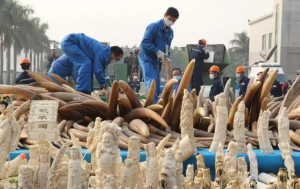Road to Geneva: How China Can Lead Fight Against Wildlife Crime
China is home to many endangered species, but is among the largest consumers of wildlife products.

Officers from the State Forestry Administration and the General Administration of Customs, destroy 6.1 ton of illegal ivory items in Dongguan, Guangdong province, ranging from elephant tusks, to smaller carved ivory items, Jan 6, 2014.
Published on China Daily http://bit.ly/1gbGiYN, Photo courtesy of Wang Zhen/Asianewsphoto
In recent years, China has demonstrated its leadership against wildlife crime through direct and high-level policies. The government’s 13th Five-Year Plan – an outline of economic and development goals – called for strengthening of customs management of wild fauna and flora products, combatting of illegal ivory and wildlife trade, and greater collaboration and foreign aid allocated for wildlife conservation.
In November 2016, 22 Chinese government departments and agencies came together to strengthen greater coordination on wildlife conservation.
What is wildlife crime?
Wildlife crime refers to all activities of illegal harvest, slaughter, smuggle, and trade of wild fauna and flora. Nowadays, wildlife crime is conducted through sophisticated and well-organized criminal groups and is often interconnected with fraud, counterfeiting, money-laundering, violence, and corruption.
As a result, wildlife crime threatens not only biodiversity—the future of species and their habitats, but also our global security, political stability, public health, and sustainable development.
 Photo courtesy of the Wilson Center
Photo courtesy of the Wilson Center
Despite these major efforts, there’s more to be done. Increasing enforcement capacity is seen as a critical weapon in this fight.
China’s Belt and Road initiative – aimed at creating stronger infrastructure for greater economic development – offers opportunities to further drive wildlife consumption.
Here’s What China Can Do Next:
- Provide comprehensive training of technical know-how and enforcement strategies to relevant government officials
- Establish an intra-government database for law enforcement, transportation, commerce, finance, and communication
- Create an open-sourced platform for NGOs and e-commerce/social networks
- Leverage existing intelligence analysis technology and software to uncover organized wildlife crime network
- Include wildlife-related crime activities, such as tax evasion, money-laundering, and drug trafficking, in wildlife crime prosecution
- Strengthen the law enforcement training to rangers in protected areas and national parks to effectively reduce wildlife poaching
- Enhance international law enforcement cooperation with Belt and Road countries
Shortly after the G7, the U.S. announced that it would no longer uphold the Paris climate accord – splitting away from a historic international agreement that symbolizes the global fight against climate change. Stunned by the backing out of the world’s second highest carbon emitter, the international arena looked to China for global climate leadership.
With China poised to take on this leadership, we sincerely look forward to seeing the country’s successful experience in combating domestic and transnational wildlife crime and effectively serving as a leader at Geneva when CITES member states gather in 2019.

